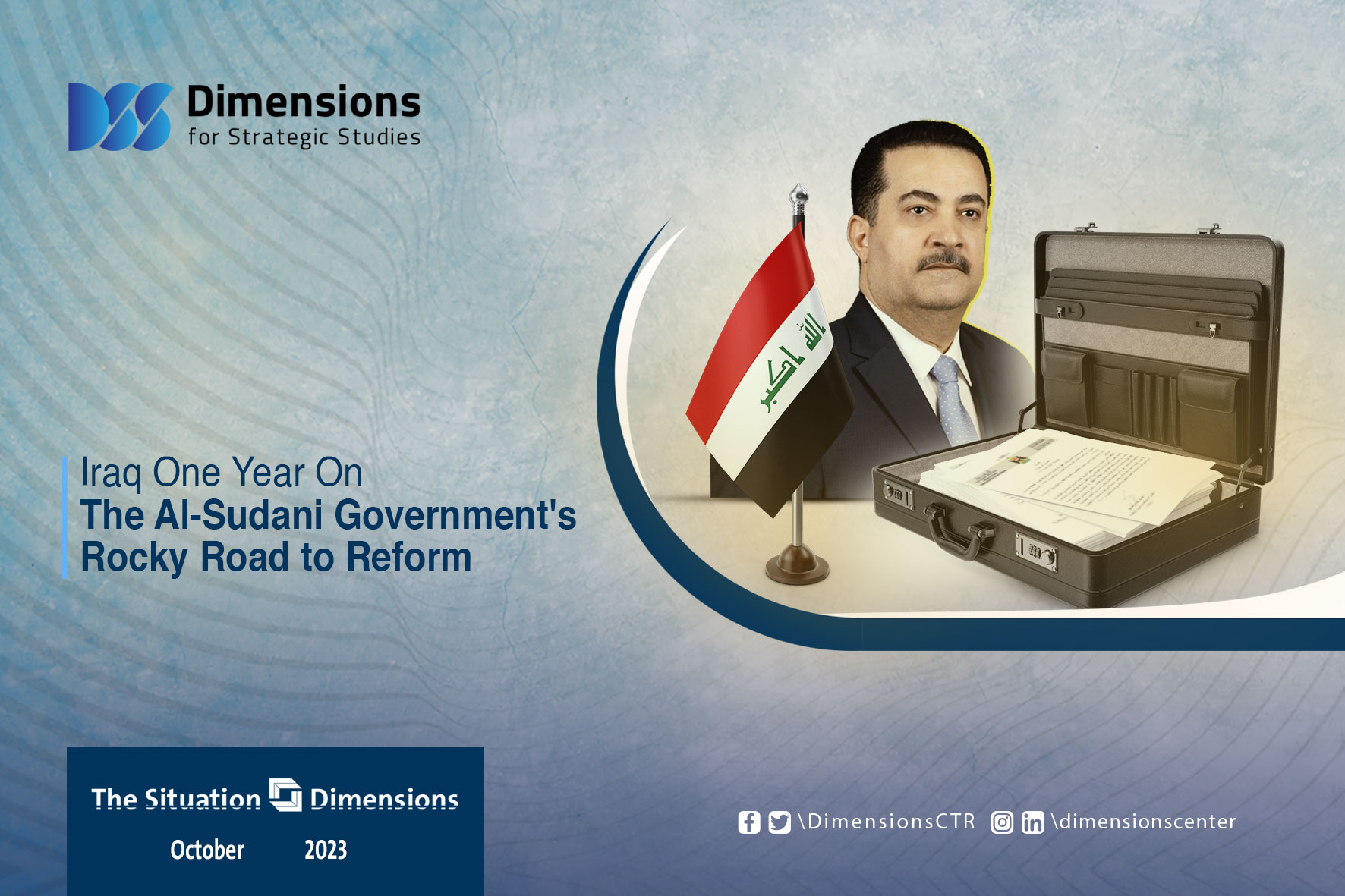
Iraq One Year On: The Al-Sudani Government's Rocky Road to Reform
2023-10-302634 view
Corruption in Iraq is widely acknowledged as a major challenge the country grapples with, casting a long shadow over the well-being of its people. The nation stands as one of the most corruption-riddled globally, landing at the 157th spot out of 180 on the 2022 Corruption Perceptions Index. Tackling this has risen to the top of the agenda, reflected in the unending stream of commitments from Iraq's leadership to root out graft. Notably, the administration of Mohammed Shia' Al Sudani didn't shy away from this trend, with Al Sudani spotlighting the anti-corruption fight in his headline pledges.
Accordingly, the "heist of the century" (2.5 billion dollars during the years 2021 and 2022) and the investigation into the fall of Mosul in 2014 at the hands of ISIS are at the forefront of the corruption files. In addition, there are accusations involving the security forces in the killing of hundreds and the wounding of thousands during the popular protests in 2019.
Despite more than a year having passed since Al Sudani took office, there appears to be no satisfying outcomes in any of the aforementioned cases, let alone the broader spectrum of corruption files. It's estimated that the total sum of embezzled funds in Iraq exceeds 400 billion dollars.
Some progress has been noted in the case of the "heist of the century" with arrest warrants issued for high-ranking officials from the previous government. However, this might not necessarily signal a radical approach to combating corruption as much as it could represent a propaganda effort to offer up some former officials as sacrificial lambs—a narrative familiar in other Arab and Middle Eastern countries—without the anti-corruption efforts significantly touching many of the involved high-level officials or militia leaders. This includes the former Iraqi Prime Minister Nouri Al-Maliki, with whom Al Sudani is considered to be associated in some capacity. Adding to Al Sudani's challenges is the fact that he himself is seen as part and parcel of the political elite that has been accused of being steeped in corruption since the succession of governments post-2003.
The structure and nature of the current Iraqi authority inherently necessitate a system of power-sharing in all administrative divisions and units, compelling any government, regardless of its members, to seek compromises based on this quota system and to form alliances that are highly complex and fragile, akin to the situation in Lebanon. This comes at the expense of national priorities and the appointment of technocrats and specialists to administrative positions.
Beyond rampant corruption, institutions suffer from poor distribution of state employees, even within a single ministry, due to hiring based on nepotism and power-sharing rather than competence and specialization. This extends to the Integrity Commission, which is the highest executive authority for pursuing corruption crimes. Under Al Sudani's tenure, this commission was assigned to a figure associated with the leader of the Badr Organization, Hadi Al-Amiri, indicating that real changes within the commission and other institutions have not occurred.
Seeking to polish its image and sway public sentiment, the Sudani administration has dipped its hands into the well of opinion polls, orchestrated by allies in its orbit. These polls, dripping with controversy, have painted a rosy picture of near-universal trust—a staggering 80%—in the government’s capability, a number that skeptically includes the legions of job seekers and those ensnared in the snare of unemployment. It’s a brush stroke that many view as an attempt to gloss over the grim canvas with veneers of optimism and unfounded confidence. This play of numbers has struck a chord of skepticism, hinting that the government’s battle against corruption may be more steeped in the art of appearance and the theatrics of promises than in the gritty reality of making deep-cut reforms.
In the ongoing tussle to weave the threads of order and state authority through Iraq's tapestry, a significant strand remains loose. The voices from the Sunni heartlands are rising, a chorus calling for the disbanding of militia tendrils that twine through their city streets. Yet, the clamor for the Popular Mobilization Forces to retreat back into the shadows has gone unanswered, hanging in the air like the dust of a neglected promise. Despite Al Sudani's vows to reclaim the cities from these groups, the urban landscape remains a chessboard of power, with kings and pawns yet to be repositioned, leaving the people yearning for a move towards true sovereignty and a checkmate over militia influence.
Regarding foreign policy issues or matters of Iraqi sovereignty, little was expected of the government's impact, given its apparent impotence in addressing more pressing domestic issues. Al Sudani’s statements often echo Iranian desires, pressuring the withdrawal or reduction of international coalition forces in Iraq, a matter that sits squarely within the chess game of Iranian-American competition for influence.
In the wake of past patterns, the winds of change seem but a gentle breeze against the steadfast dunes of Iraq’s internal landscape, shaped and reshaped since 2003. The present government's efforts and pledges are often seen more as ceremonial fanfare, akin to the desert mirages—full of promise from a distance yet delivering little substance upon approach. It seems the dance of transformation is slow, with steps mired in the old rhythm of rhetoric over reform, leaving the heartbeat of Iraq waiting for the tempo of tangible change to truly take hold.





